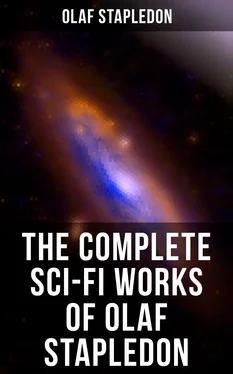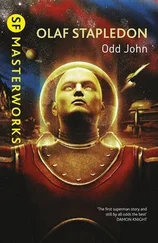Olaf Stapledon - The Complete Sci-Fi Works of Olaf Stapledon
Здесь есть возможность читать онлайн «Olaf Stapledon - The Complete Sci-Fi Works of Olaf Stapledon» — ознакомительный отрывок электронной книги совершенно бесплатно, а после прочтения отрывка купить полную версию. В некоторых случаях можно слушать аудио, скачать через торрент в формате fb2 и присутствует краткое содержание. Жанр: unrecognised, на английском языке. Описание произведения, (предисловие) а так же отзывы посетителей доступны на портале библиотеки ЛибКат.
- Название:The Complete Sci-Fi Works of Olaf Stapledon
- Автор:
- Жанр:
- Год:неизвестен
- ISBN:нет данных
- Рейтинг книги:5 / 5. Голосов: 1
-
Избранное:Добавить в избранное
- Отзывы:
-
Ваша оценка:
- 100
- 1
- 2
- 3
- 4
- 5
The Complete Sci-Fi Works of Olaf Stapledon: краткое содержание, описание и аннотация
Предлагаем к чтению аннотацию, описание, краткое содержание или предисловие (зависит от того, что написал сам автор книги «The Complete Sci-Fi Works of Olaf Stapledon»). Если вы не нашли необходимую информацию о книге — напишите в комментариях, мы постараемся отыскать её.
Novels:
Last and First Men: A Story of the Near and Far Future
Last Men in London
Odd John: A Story Between Jest and Earnest
Star Maker
Darkness and the Light
Sirius: A Fantasy of Love and Discord
Death into Life
Short Stories:
The Flames (1947)
The Seed and the Flower
The Road to the Aide Post
A Modern Magician
East is West
A World of Sounds
Arms Out of Hand
The Complete Sci-Fi Works of Olaf Stapledon — читать онлайн ознакомительный отрывок
Ниже представлен текст книги, разбитый по страницам. Система сохранения места последней прочитанной страницы, позволяет с удобством читать онлайн бесплатно книгу «The Complete Sci-Fi Works of Olaf Stapledon», без необходимости каждый раз заново искать на чём Вы остановились. Поставьте закладку, и сможете в любой момент перейти на страницу, на которой закончили чтение.
Интервал:
Закладка:
It may seem to some incredible that the culture of the Seventh Men should have lasted so long. Surely it must either have decayed through mere monotony and stagnation or have advanced into richer experience. But no. Generation succeeded generation, and each was too short-lived to outlast its young delight and discover boredom. Moreover, so perfect was the adjustment of these beings to their world, that even if they had lived for centuries they would have felt no need of change. Flight provided them with intense physical exhilaration, and with the physical basis of a genuine and ecstatic, though limited, spiritual experience. In this their supreme attainment they rejoiced not only in the diversity of flight itself, but also in the perceived beauties of their variegated world, and most of all, perhaps, in the thousand lyric and epic ventures of human intercourse in an aerial community.
The end of this seemingly everlasting elysium was nevertheless involved in the very nature of the species. In the first place, as the ages lengthened into aeons, the generations preserved less and less of the ancient scientific lore. For it became insignificant to them. The aerial community had no need of it. This loss of mere information did not matter so long as their condition remained unaltered; but in due course biological changes began to undermine them. The species had always been prone to a certain biological instability. A proportion of infants, varying with circumstances, had always been misshapen; and the deformity had generally been such as to make flight impossible. The normal infant was able to fly early in its second year. If some accident prevented it from doing so, it invariably fell into a decline and died before its third year was passed. But many of the deformed types, being the result of a partial reversion to the pedestrian nature, were able to live on indefinitely without flight. According to a merciful custom these cripples had always to be destroyed. But at length, owing to the gradual exhaustion of a certain marine salt essential to the high-strung nature of the Seventh Men, infants were more often deformed than true to type. The world-population declined so seriously that the organized aerial life of the community could no longer be carried on according to the time-honoured aesthetic principles. No one knew how to check this racial decay, but many felt that with greater biological knowledge it might be avoided. A disastrous policy was now adopted. It was decided to spare a carefully selected proportion of the deformed infants, those namely which, though doomed to pedestrianism, were likely to develop high intelligence. Thus it was hoped to raise a specialized group of persons whose work should be biological research untrammelled by the intoxication of flight.
The brilliant cripples that resulted from this policy looked at existence from a new angle. Deprived of the supreme experience for which their fellows lived, envious of a bliss which they knew only by report, yet contemptuous of the naïve mentality which cared for nothing (it seemed) but physical exercise, love-making, the beauty of nature, and the elegances of society, these flightless intelligences sought satisfaction almost wholly in the life of research and scientific control. At the best, however, they were a tortured and resentful race. For their natures were fashioned for the aerial life which they could not lead. Although they received from the winged folk just treatment and a certain compassionate respect, they writhed under this kindness, locked their hearts against all the orthodox values, and sought out new ideals. Within a few centuries they had rehabilitated the life of intellect, and, with the power that knowledge gives, they had made themselves masters of the world. The amiable fliers were surprised, perplexed, even pained; and yet withal amused. Even when it became evident that the pedestrians were determined to create a new world-order in which there would be no place for the beauties of natural flight, the fliers were only distressed while they were on the ground.
The islands were becoming crowded with machinery and flightless industrialists. In the air itself the winged folk found themselves outstripped by the base but effective instruments of mechanical flight. Wings became a laughing stock, and the life of natural flight was condemned as a barren luxury. It was ordained that in future every flier must serve the pedestrian world-order, or starve. And as the cultivation of wind-borne plants had been abandoned, and fishing and fowling rights were strictly controlled, this law was no empty form. At first it was impossible for the fliers to work on the ground for long hours, day after day, without incurring serious ill-health and an early death. But the pedestrian physiologists invented a drug which preserved the poor wage-slaves in something like physical health, and actually prolonged their life. No drug, however, could restore their spirit, for their normal aerial habit was reduced to a few tired hours of recreation once a week. Meanwhile, breeding experiments were undertaken to produce a wholly wingless large-brained type. And finally a law was enacted by which all winged infants must be either mutilated or destroyed. At this point the fliers made an heroic but ineffectual bid for power. They attacked the pedestrian population from the air. In reply the enemy rode them down in his great aeroplanes and blew them to pieces with high explosive.
The fighting squadrons of the natural fliers were finally driven to the ground in a remote and barren island. Thither the whole flying population, a mere remnant of its former strength, fled out of every civilized archipelago in search of freedom: the whole population—save the sick, who committed suicide, and all infants that could not yet fly. These were stifled by their mothers or next-of-kin, in obedience to a decree of the leaders. About a million men, women and children, some of whom were scarcely old enough for the prolonged flight, now gathered on the rocks, regardless that there was not food in the neighbourhood for a great company.
Their leaders, conferring together, saw clearly that the day of Flying Man was done, and that it would be more fitting for a high-souled race to die at once than to drag on in subjection to contemptuous masters. They therefore ordered the population to take part in an act of racial suicide that should at least make death a noble gesture of freedom. The people received the message while they were resting on the stony moorland. A wail of sorrow broke from them. It was checked by the speaker, who bade them strive to see, even on the ground, the beauty of the thing that was to be done. They could not see it; but they knew that if they had the strength to take wing again they would see it clearly, almost as soon as their tired muscles bore them aloft. There was no time to waste, for many were already faint with hunger, and anxious lest they should fail to rise. At the appointed signal the whole population rose into the air with a deep roar of wings. Sorrow was left behind. Even the children, when their mothers explained what was to be done, accepted their fate with zest; though, had they learned of it on the ground, they would have been terror-stricken. The company now flew steadily West, forming themselves into a double file many miles long. The cone of a volcano appeared over the horizon, and rose as they approached. The leaders pressed on towards its ruddy smoke plume; and unflinchingly, couple by couple, the whole multitude darted into its fiery breath and vanished. So ended the career of Flying Man.
3. A MINOR ASTRONOMICAL EVENT
Table of Contents
The flightless yet still half avian race that now possessed the planet settled down to construct a society based on industry and science. After many vicissitudes of fortune and of aim, they produced a new human species, the Eighth Men. These long-headed and substantial folk were designed to be strictly pedestrian, physically and mentally. Apt for manipulation, calculation, and invention, they very soon turned Venus into an engineer’s paradise. With power drawn from the planet’s central heat, their huge electric ships bored steadily through the perennial monsoons and hurricanes, which also their aircraft treated with contempt. Islands were joined by tunnels and by millipede bridges. Every inch of land served some industrial or agricultural end. So successfully did the generations amass wealth that their rival races and rival castes were able to indulge, every few centuries, in vast revelries of mutual slaughter and material destruction without, as a rule, impoverishing their descendants. And so insensitive had man become that these orgies shamed him not at all. Indeed, only by the ardours of physical violence could this most philistine species wrench itself for a while out of its complacency. Strife, which to nobler beings would have been a grave spiritual disaster, was for these a tonic, almost a religious exercise. These cathartic paroxysms, it should be observed, were but the rare and brief crises which automatically punctuated ages of stolid peace. At no time did they threaten the existence of the species; seldom did they even destroy its civilization.
Читать дальшеИнтервал:
Закладка:
Похожие книги на «The Complete Sci-Fi Works of Olaf Stapledon»
Представляем Вашему вниманию похожие книги на «The Complete Sci-Fi Works of Olaf Stapledon» списком для выбора. Мы отобрали схожую по названию и смыслу литературу в надежде предоставить читателям больше вариантов отыскать новые, интересные, ещё непрочитанные произведения.
Обсуждение, отзывы о книге «The Complete Sci-Fi Works of Olaf Stapledon» и просто собственные мнения читателей. Оставьте ваши комментарии, напишите, что Вы думаете о произведении, его смысле или главных героях. Укажите что конкретно понравилось, а что нет, и почему Вы так считаете.












